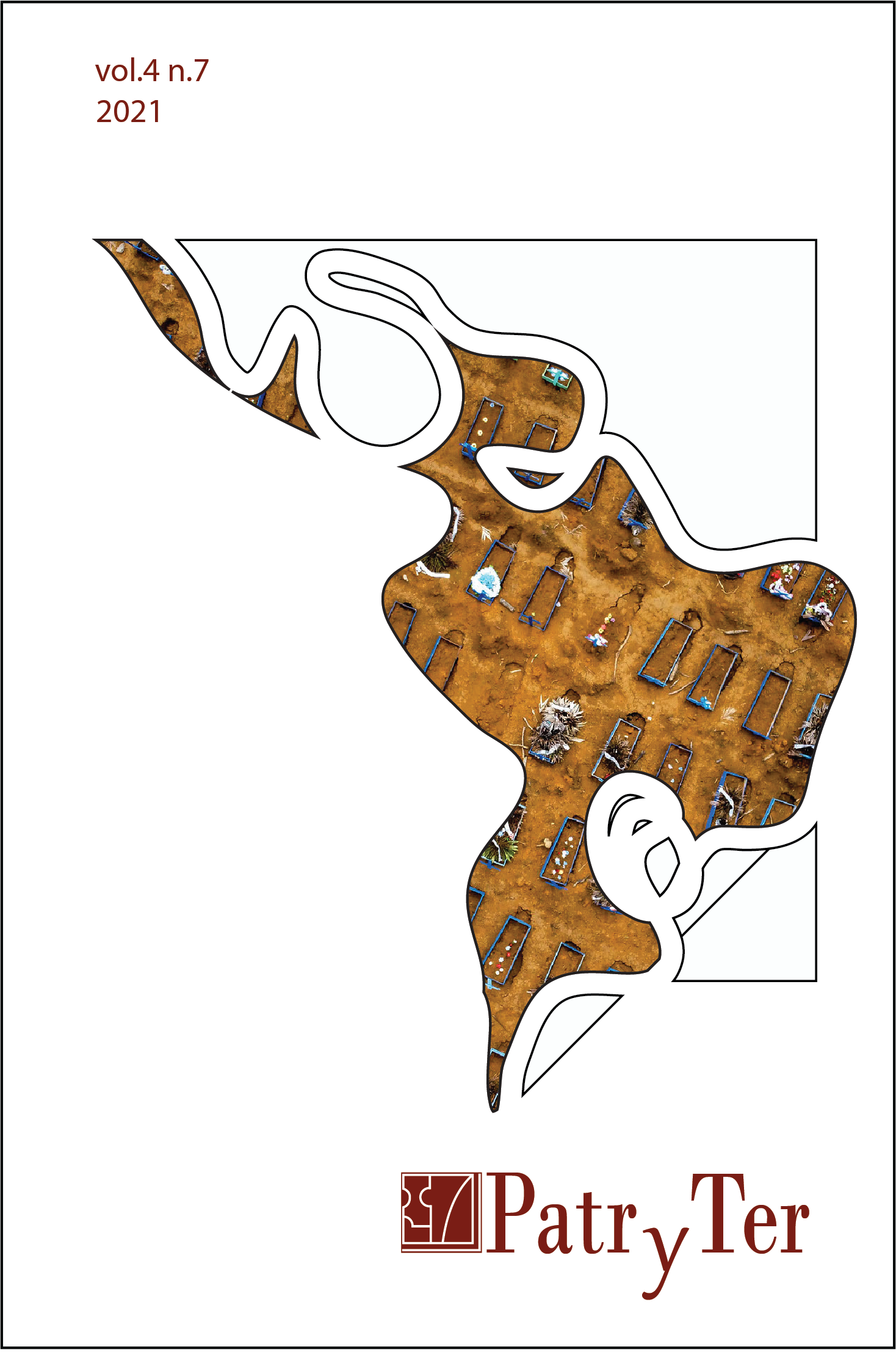The "monument center" and patrimonialization of Sobral, Ceará, Brazil
DOI:
https://doi.org/10.26512/patryter.v4i7.29311Keywords:
Historical and cultural heritage. monument center. monumentalization. identity. politics.Abstract
The article discusses the process of patrimonialization of the city of Sobral, in the Brazilian state of Ceará, as guided by a certain way of seeing urbanization and education. The policy of preserving cultural heritage applied at the historic site is used as the place for a discourse that defines a model of tradition, at the same time of modernity, built by the almost political group anchored in the family “Ferreira Gomes”. This discourse is present in public policies for urbanization and education. The article reads the PDDU of the city, and a textbook on local history and geography produced for municipal elementary education and tries to explain how heritage is present in these documents, crossing with other documentary sources and memories of the researcher. This reading shows that the identity and cultural heritage listed, therefore, cannot be understood as representative of all Sobralenses, but of those who defend a certain model of city.
Downloads
References
Balandier, G. (1997). A desordem: elogio do movimento. Rio de Janeiro: Bertrand Brasil.
Barbosa, M. E. J., Lucas, M. R. L., Souza, R. N. R., & Vasconcelos, R. I. V. (2000). Sobral: Patrimônio Histórico. Sobral: Prefeitura Municipal de Sobral.
Caracristi, I., & Saboya, G. (2002). Descobrindo e construindo Sobral: conhecimentos de Geografia e História. Fortaleza: Edições Demócrito Rocha.
Deleuze, G. (1997). Mil platôs: capitalismo e esquizofrenia. São Paulo: Editora 34.
Duarte Júnior, R. (2012). Sítios Históricos Brasileiros: monumento, documento, empreendimento e instrumento ”“ o caso de Sobral-CE. (Tese de Doutorado em Arquitetura e Urbanismo). Faculdade de Arquitetura e Urbanismo da Universidade de São Paulo, São Paulo.
Freitas, N. A. (2000). Sobral, opulência e tradição. Sobral, CE: Edições UVA.
Freitas, N. A. (2003). Práticas, rituais e regras de disputa no tempo da política em Sobral. In R. V. A. Carvalho (Org.). A produção da política em campanhas eleitorais: eleições municipais de 2000 (pp. 211-230). Campinas, SP: Pontes.
Freitas, N. A. (2005). O sabor de uma cidade: práticas cotidianas dos habitantes de Sobral. (Tese de Doutorado em Sociologia). Universidade Federal do Ceará, Fortaleza.
Freitas, N. A. (2010). Ação, efeito e manobras: o "artefato primoroso" da monumentalização de Sobral e seus usos no campo político. In N. A. Freitas, V. C. C. Holanda & M. Maria Júnior (Orgs.). Múltiplos olhares sobre a cidade e o urbano: Sobral e região em foco (pp. 216-243). Sobral, CE: UECE/UVA.
Frota, D. J. T. (1995). História de Sobral. Fortaleza: Imprensa Oficial do Ceará.
Henriques, E. B. (2004). O Patrimônio nas Políticas Territoriais. In Actas do V Congresso de Geografia Português (pp. 1-11). Portugal. Recuperado em 29 julho, 2019, de http://www.apgeo.pt/files/docs/CD_V_Congresso_APG/web/_pdf/E5_14Out_Eduardo%20Brito%20Henriques.pdf
Herzfeld, M. (1991). A place in history: social and monumental time in a Creta town. Princeton: Pinceton University Press.
Le Goff, J. (1994). Documento/monumento. In J. Le Goff. (Org.). História e memória (pp. 535-549). Campinas, SP: Editora da UNICAMP.
Mayer, A. (1987). A importância dos “quase-grupos” no estudo das sociedades complexas. In B. Feldman-Bianco (Org.). Antropologia das sociedades contemporâneas (pp. 127-158). São Paulo: Global.
Mont’Alverne Girão, G. G., & Soares, M. N. M. (1997). Sobral: história e vida. Sobral, CE: Edições UVA.
Palmeira, M., & Heredia, B. (1995). Os comícios e a política de facção. Anuário Antropológico, 19 (1), 95-125. Recuperado em 29 julho, 2019, de https://periodicos.unb.br/index.php/anuarioantropologico/article/view/6587 .
Silva, E. P. (2000). Patrimônio e identidade: desafios do turismo cultural. ANTROPOlógicas, (4), 217-224. Recuperado em 29 julho, 2019, de https://revistas.rcaap.pt/antropologicas/article/view/932.
Silva Júnior, A. S. (2015). Cidades Sagradas: da Roma Cearense à "Jerusalém Sertaneja" - A igreja Católica e o desenvolvimento urbano no Ceará (1870-1920) - Sobral e Juazeiro do Norte. 1ª. ed. Sobral, CE: ECOA.
Downloads
Published
Issue
Section
License
Copyright (c) 2021 PatryTer

This work is licensed under a Creative Commons Attribution-NonCommercial-NoDerivatives 4.0 International License.
Please be advised that Revista Patryter is licensed under a Creative Commons Attribution-NonCommercial-NoDerivatives 4.0 International License (CC BY-NC-ND 4.0) https://creativecommons.org/licenses/by-nc-nd/4.0/deed.en
Authors who publish in the PatryTer Magazine agree to the following terms:
- Authors retain the copyright and grant the journal the right of first publication, the work being simultaneously licensed under the Creative Commons Attribution-NonCommercial-NoDerivatives 4.0 International License (CC BY-NC-ND 4.0) which allows the sharing of the work with recognition of the authorship of the work and initial publication in this journal.
- The contribution is original and unpublished and is not being evaluated for publication by another journal. When submitting the article, authors should attach as a supplementary document a Letter addressed to the PatryTer's Editor, indicating the academic merits of the submitted work (relevance, originality and origin of the article, that is, from what type of research]. This letter must be signed by all authors.
- The authors authorize PatryTer Journal to publish the article in public and private databases, in Brazil and abroad.
- Authors declare that they are fully responsible for the entire contents of the contribution that they submit to the Editorial Board of PatryTer Magazine.
- Authors declare that there is no conflict of interest that could interfere in the impartiality of the scientific papers submitted to the PatryTer Magazine Editorial Board.
- Authors are authorized to take additional contracts separately, for non-exclusive distribution of the version of the work published in this journal (eg publish in institutional repository or as a book chapter), with acknowledgment of authorship and initial publication in this journal.
Authors are allowed and encouraged to publish and distribute their work online (eg in institutional repositories or on their personal page) at any point before or during the editorial process, as this can generate productive changes as well as increase the impact and the citation of the published work (See The Effect of Free Access).


